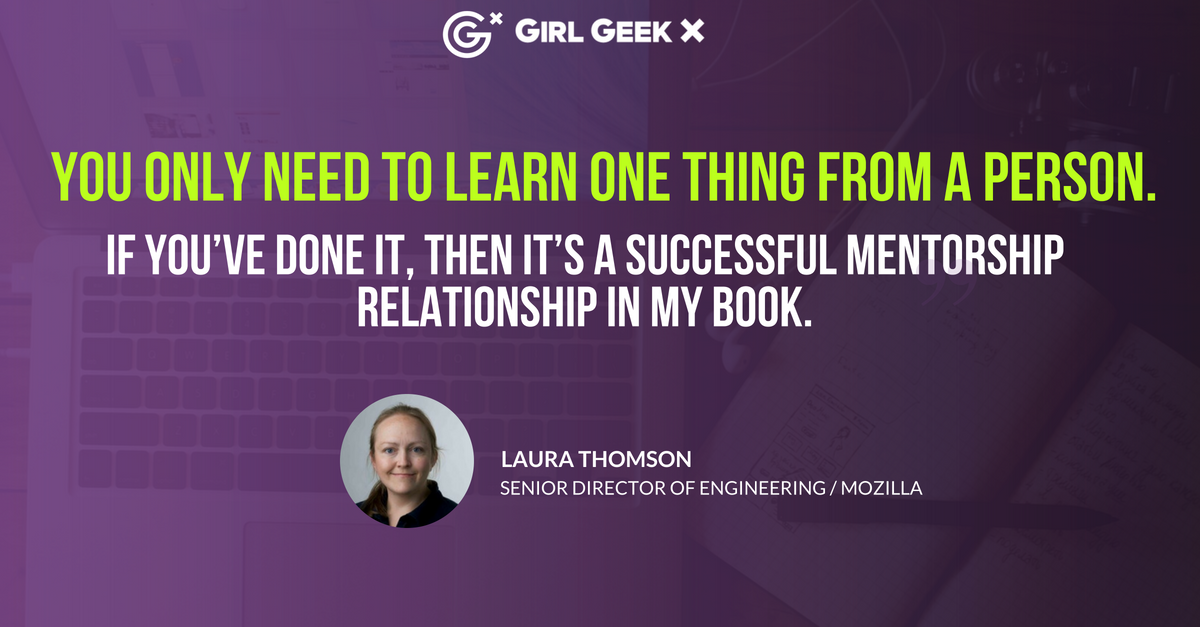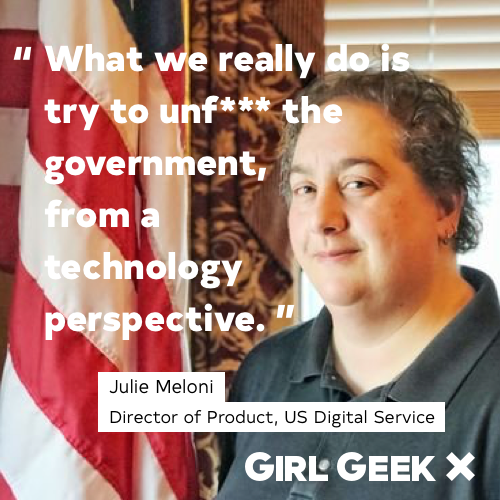Like what you see here? Our mission-aligned Girl Geek X partners are hiring!
- See open jobs at SquareTrade and check out open jobs at our trusted partner companies.
- Does your company want to sponsor a Girl Geek Dinner in 2021? Talk to us!
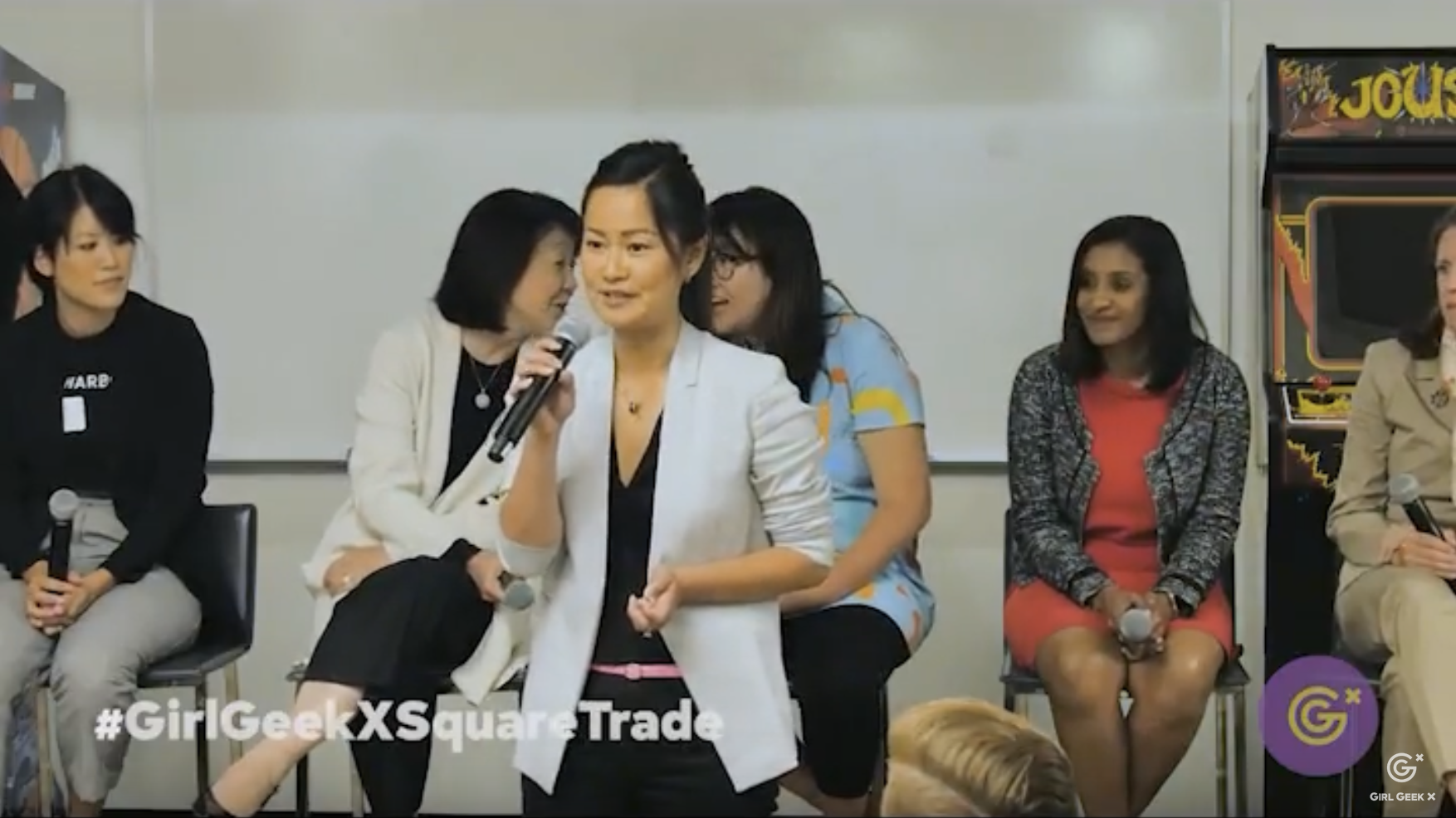
Josephine Chan welcoming the sold-out crowd at SquareTrade Girl Geek Dinner.
Panelists:
Wini Hebalkar / VP, Supply Chain & Operations / SquareTrade
Margaret Reeves / VP, Product / SquareTrade
Bonnie Shu / Product Compliance Manager / Harbor
Claire Hough / Head of Engineering / Udemy
Lisa Q. Fetterman / CEO & Founder / Nomiku
Nupur Srivastava / VP, Product / Grand Rounds
Staci Slaughter / EVP, Communications / SF Giants
Transcript of SquareTrade Girl Geek Dinner – Panel:
Josephine Chan (SquareTrade): Hello everybody! I am Josephine, Head of People at SquareTrade. We want to welcome all of you here tonight. I look around and what an amazing crowd in this room. All of us at SquareTrade are really honored to be host of this meaningful event, a panel of inspiring and wise female leaders will begin really shortly. I know they will help us lean and geek out. Some of us asked about what SquareTrade does, so I thought I would do a really quick 30-second intro — At SquareTrade, we are disrupting a $30 billion industry with innovation and also our attention to our customer happiness. We provide the protection that covers those everyday, little calamities like spills, breaks, and mishaps on your phones, or appliances, or TVs, or laptops, you name it. We’re also really proud to partner with some of the biggest retailers like Amazon, Costco, Staples, Target, and many, many others.
Josephine Chan (SquareTrade): What do we do here? We are turning a bad day into a good day every single day for our customers. We have more than 40 million of them and growing. Today we’re really excited to sponsor this really special event. Thank you Girl Geek for giving us this opportunity — our first dinner — and I hope this says a lot about our commitment to women in our field and actually, women in any other field, in any other industries, including all of you here. And now, I’m really delighted to introduce my colleague. She is also the moderator of the night, Wini – she runs Supply Chain and Operations at SquareTrade.
Wini Hebalkar (SquareTrade): Thank you, Josephine. Can everyone hear me back there? We’re good? All right. Well, good evening everyone and welcome to the first SquareTrade Girl Geek Dinner. We’re very excited to introduce our six panelists who are going to be here. Each of the panelists is a leader in their own right and in a very different industry from the other… that was intentional.
Wini Hebalkar (SquareTrade): We wanted to showcase what leadership is within the broad range of industries represented here in the [San Francisco] Bay Area. Let’s start out with starting at the far end, introduce yourself, tell us who you are, the role that you’re in, and what is the one piece of leadership advice you’d like to share with the group here? Obviously some aspiring leaders, some actual leaders in their own fields. But what’s the one take away you’d like them to leave with or perhaps a story that you’d like to start us out with around how you got started in leadership?
Margaret Reeves (SquareTrade): I’m Margaret Reeves. I’m VP of Product here at SquareTrade, so welcome everyone. It’s very exciting to have you all here. Yeah, woo hoo! Gosh, takeaway…
Wini Hebalkar (SquareTrade): Take one, one piece of advice you’d like to share. Anything.
Margaret Reeves (SquareTrade): Okay, one piece of advice. This is a piece of advice I got from Lorrie Norrington who presented at an event like this. She was very senior at eBay, Intuit; she’s now an operating partner somewhere. Her piece of advice which has stuck with me all these years is your career is a marathon, not a sprint. You have successes and you have set backs, but remember, it’s going to be for a while so don’t get too down when something doesn’t go the way you want it to go.
Wini Hebalkar (SquareTrade): Okay, Bonnie? Thank you, Margaret.
Bonnie Shu (Harbor): Hi everyone and thank you so much for having me here and Girl Geek as well. I’m so thrilled to be here. My name is Bonnie and I am running the Compliance team over at Harbor which is a compliance platform for issuing private securities. Before that, kind of along the lines of the career advice that you just heard, I actually started my career out as a lawyer, hated it, gave it up, went into tech. My advice to all of you is just to keep persisting. When you come up against a really difficult challenge or a really difficult moment in your life, just keep going.
Claire Hough (Udemy): I’m Claire Hough. I’m the Head of Engineering for Udemy. Udemy is an eLearning marketplace. How many of you have taken a course on Udemy? Yes! This is great. I do these events a lot and I always ask this question. In the beginning when I was Udemy in the early days, I would ask this question and there would be few hands that are going up, so come and take a course at Udemy, it’s a place where you can pretty much learn anything. It’s a marketplace, meaning we bring teachers as well as students together in the marketplace. We also offer those courses to companies, so any companies here can actually sign up to offer our courses to their employees. It’s not just a perk, it’s a learning opportunity. We have 400 people at Udemy, about 30,000 instructors and 45,000 courses. I’ve been at Udemy for five years and I’ve been around the block a few times as a Head of Engineering. Actually worked with Josephine in the old days. That’s how I got recruited.
Claire Hough (Udemy): One piece of advice I want to give you would be tech is many things, right? So you have to find the tech that you feel passionate about, like a lot of us here work in different things. If you are in a job where you’re not sure you really love the product, then go find something else because you’ll find that when you’re passionate about, you’ll go further in your career.
Claire Hough (Udemy): That’s my advice: find something you are passionate about. Udemy is an eLearning marketplace. Our mission is to improve lives through learning and who wouldn’t get on that mission? Because the mission is so compelling to me, I know that I put more of my energy and more of my passion behind the job that I have.
Wini Hebalkar (SquareTrade): Thank you, Claire.
Lisa Fetterman (Nomiku): I have to tell you how energized I am to be here, to be around people who, you know, nobody forced your hand to go to Geek Girl. You’re here because you want to be here. I can feel it. We want to rise ourselves, we want to rise the community up. It feels really good. My name is Lisa Fetterman and I’m the Founder of Nomiku. We invented the home sous-vide immersion circulator. We manufacture our hardware, software, food, all here. We have our new program where you wave our food in front of the machine, it automatically recognizes it… In 30 minutes, you get a gourmet sous-vide meal, just the way Noma, Saison, Restaurant at Meadowood, Eleven Madison Park, Atelier Crenn does it because they use our machines there. I’m the writer of two cookbooks: “Sous Vide at Home”, “Sous Vide Made Simple.” There’s a theme there… I’m here because Josephine and I nanny share, yo! Yes!
Lisa Fetterman (Nomiku): That’s that female power network! That’s how shit gets done. The boys are smoking cigars and drinking whiskey; I’m like, “Hey, your baby friend takes care of my baby friend.” That’s a bond. My big piece of advice for everybody here is that … Well, more of what I see is you are right. Whatever it is you are building right now, you’re right. I guarantee you: you’re right. If I could give a piece of advice to myself when I first started Nomiku, which was in 2012 and invented the home sous-vide immersion circulator — holy shiznit! I went to a party and I was like, “I invented the home sous-vide.” They’re like, “Oh, I invented Post-its.” I’m like, “Uh … Okay.” I would just say to myself, “You are right.” Just imagine if you’re right. If you’re right and you can’t go wrong, why wouldn’t you do the next thing that you’re going to do? Just know that you’re right and move in that direction.
Nupur Srivastava (Grand Rounds): I am so energized right now and hungry! I really want a sous-vide piece of meat, so maybe later at night. Hi everyone! My name is Nupur. I lead Product at a company called Grand Rounds. I think I was invited because I’m in the same building — that’s basically why I was invited.
Wini Hebalkar (SquareTrade): You can tell there’s a theme here.
Nupur Srivastava (Grand Rounds): Yes. They want to … I think you guys believe in limiting gas emissions or something, making sure our commutes were easy… so yes, I’m in the same building! I’ll tell you a little bit about Grand Rounds. I completely agreed on the piece about passion. At Grand Rounds, we connect members to high-quality care. We’ve spent the past five years trying to understand what exactly makes a high-quality physician and we help members that are sick get connected to the right care so that they can get better faster. When we first started the company, we were shocked — Over 66% of the patients that were coming to us were changing their diagnoses or treatment. There’s that much bad quality healthcare in this country. We try and do our best to get patients to better care and we sell to large self-insured employers so that we can give their members access to high-quality care so that they can get better faster.
Nupur Srivastava (Grand Rounds): The piece of advice that I will give, and some of this will make more sense as I share some stories, is it’s kind of cliched but I truly believe you miss all the shots you don’t take. In my life, I’ve been lucky to have many strong women around me and on my team and I can firmly say that it’s really important for you guys to demand what you deserve because time and again, I see really, really talented women underselling themselves and not demanding what they deserve. So you miss all the shots you don’t take, you gotta try, and you gotta ask for things that you deserve.
Staci Slaughter (SF Giants): Good evening everyone. My name is Staci Slaughter and I’m the Executive Vice President of Communications for the San Francisco Giants. Yeah, go Giants! My kids would probably laugh that I’m here speaking to a bunch of people in tech because I’m the most technologically challenged person on the Earth. I was one of the first female executives in Major League Baseball. I guess maybe that’s why I’m here. I work with a lot of dudes, as you guys probably all do.
Staci Slaughter (SF Giants): But I think, I guess for me, one of the things that I tried to do from a management style perspective is my philosophy in management is that you want the people who work for you to be able to step in and do your job at any single moment if you by some chance get hit by the proverbial bus or you can’t come into work, that you don’t hold people down, that you feel like they can work alongside of you.
Staci Slaughter (SF Giants): Really, my goal is to get the next generation of Giants folks — we’re a 138-year-old franchise and I’ve been there 22 years and it’s time for me to think about the next stage in life at some point. I want to make sure that the folks who work with me are able to take their experience and then be able to be the next generation of stewards in our organization.
Wini Hebalkar (SquareTrade): Thank you. Here’s the first question I’m going to direct at you guys. Some of you described and provided some great advice around leadership and what people can take away today, but think back to the point in your career where there was a pivotal moment or a turning point that propelled you into a “a leadership position.” Right? Whatever that might mean for you, whether it’s the current role you’re in or a role that you had prior to that that set you up. Nupur, would you like to start us off?
Nupur Srivastava (Grand Rounds): Sure. So I’ll provide a little bit of a background. I joined Grand Rounds about four years ago and I joined as a Senior Product Manager in the company. I loved the company and worked to build out a great product team. There was a time when I got promoted to Director and I was really excited about it. But we were scaling as a company and my CEO told me that he’s looking to bring in a VP of Product to consolidate different product functions that we had.
Nupur Srivastava (Grand Rounds): I was actually really excited; I helped interview, I was actually vouching for a couple of the candidates. Once I was in the room with him, we were discussing a candidate and he looked me straight in the eye and said, “Why have you not asked me for this role?” I was like, “Because I didn’t think it was an option. I didn’t know that’s a thing you can do.”
Nupur Srivastava (Grand Rounds): It really was a pretty shocking and pivotal moment for me because he saw my leadership potential way before I believed I could be a leader or even deserved to be the VP of Product. I was lucky he gave me the role. Now I lead the Product team and I’ve grown the team out. But I think the biggest thing that taught me is …
Nupur Srivastava (Grand Rounds): This comes back to why I was saying – “You miss all the shots you don’t take.” It really made me think about what are other opportunities where we’re not raising our hand for? And what other things are passing us by?
Nupur Srivastava (Grand Rounds): That is a moment that has stuck with me and I constantly think of that, even with my own team, which I certainly tend to have it be female-heavy because why not? You’re always looking out for these instances where people are not asking for what they deserve and I see it time again. If Owen, my CEO, hadn’t said that to me, I would have been probably still happy but reporting to another VP of Product and probably not talking to you guys tonight.
Wini Hebalkar (SquareTrade): Great. Bonnie, how about you?
Bonnie Shu (Harbor): For myself, well, Harbor’s a pretty young company so I’ll talk about my previous experience. After I quit law, gave it up, decided to move into tech, I joined a company called Zenefits. While I was there, I was basically hired to put out fires. I was put on this client escalations team which basically meant anyone who’s really, really pissed off came to my team. Really what that did, though, was put myself in the spotlight for really high-profile issues. Whenever there was a company-wide issue that was impacting a lot of clients, myself and my team were the first people that the leadership would come to.
Bonnie Shu (Harbor): When I tackled that head-on and jumped right into it, didn’t shy away from it, really. Sometimes it’s easy for us, when it’s a really difficult problem or a really stressful problem, or a really high-profile problem, it’s easy to freak out and throw your hands up in the air and say, “I don’t know what to do here.” But really, it was a lot of persisting, as I said, and just trying to figure out a solution to the problem. I was blessed with a really great group of operations analysts that were working underneath me, some of whom are here, actually.
Bonnie Shu (Harbor): My team was really involved in the clean-up crew. We would help fix client issues. After that, the leadership team, really, I think, saw the potential for me to take on more very highly stressful clean-up fixes.
Bonnie Shu (Harbor): Whenever there was a high-profile issue like there was a time where we had a tenuous partner relationship and we needed to build a new payroll product, they came to me and said, “Will you help us build this?” And then when compliance became in the spotlight for the company, they came to me and said, “Will you build this compliance team out?” And so really, I think what it was was getting to be on these really high-profile issues and proving myself as a really hard worker and someone who didn’t shy away from the issue.
Wini Hebalkar (SquareTrade): So raise your hand again, right? Make sure you volunteer for those opportunities.
Bonnie Shu (Harbor): Exactly, exactly. Step up in those rare moments where you can really shine.
Wini Hebalkar (SquareTrade): Margaret, I know you have a story to tell around this because you and I have talked quite a bit about it.
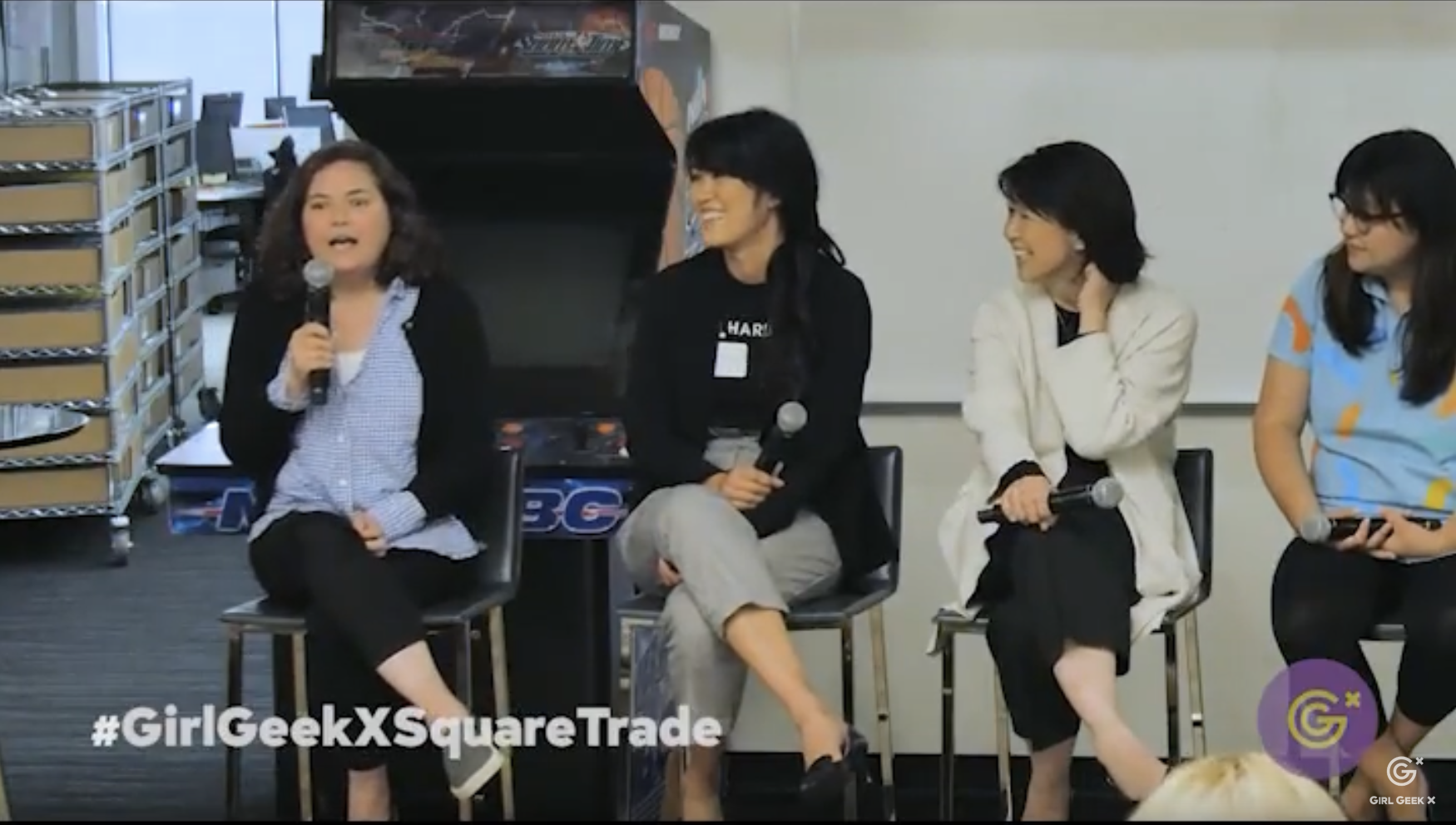
Margaret Reeves speaking at SquareTrade Girl Geek Dinner.
Margaret Reeves (SquareTrade): I do have a story. A big turning point in my career was actually when I turned down what was essentially a promotion. And I turned it down because I was in an operations group at the time and this role required a daily 8:30 meeting. I am not a morning person. This was not going to work. My manager was like, “But this would be great! We think you’re really suited.” I’m like, “Yeah, no. Thanks, no.” And the people who work with me are all going, “Yeah, I can see this.”
Margaret Reeves (SquareTrade): Finally, they came to me and said, “Okay. We want you to take this role. You don’t have to go to the meeting except when there’s a major incident.” Somehow we left this meeting, my boss thought I would come to this meeting when there was a major incident and I left thinking I would not come to this meeting when there was a major incident. Never went to the meeting. Did take the role. It really played into a lot of my strengths. It allowed me to … I grew from there. I took on a lot more responsibility, I got a team, so it was a great stepping stone. Like I said, I played to my strengths and I managed to not have to deal with my weaknesses or worked around one of my weaknesses. Yeah, big turning point but started with actually saying, “No.”
Wini Hebalkar (SquareTrade): Staci, I know you’ve been in the industry and in the communications role for a very long time. What started you off? What was that pivotal point?
Staci Slaughter (SF Giants): In communications or leadership?
Wini Hebalkar (SquareTrade): Either.
Staci Slaughter (SF Giants): Well, gosh, I’ve been working in communications for long time before the Giants. I graduated from Berkeley. Go Bears!
Claire Hough (Udemy): Bears!
Staci Slaughter (SF Giants): I went to work for a PR firm. I grew up around journalism. I worked in politics before; I had been the Press Secretary to the Mayor in San Francisco before the Giants called. But I was always an implementer, you know? I wasn’t a manager, if you will. And so even when I got hired to work for the Giants, I was hired to work on all of the communications and media strategy around the building of AT&T Park, so this is how long ago it was. We still call it “the new ball park” but we’re having our 20th year next year. I was the one writing the press releases, I was the one taking the media on tours of the construction site, I was doing media communication strategies, but I still had a staff. I kept getting promoted and I had folks that I … But I was still kind of trying to do everything myself and not delegating and not empowering people to do the work.
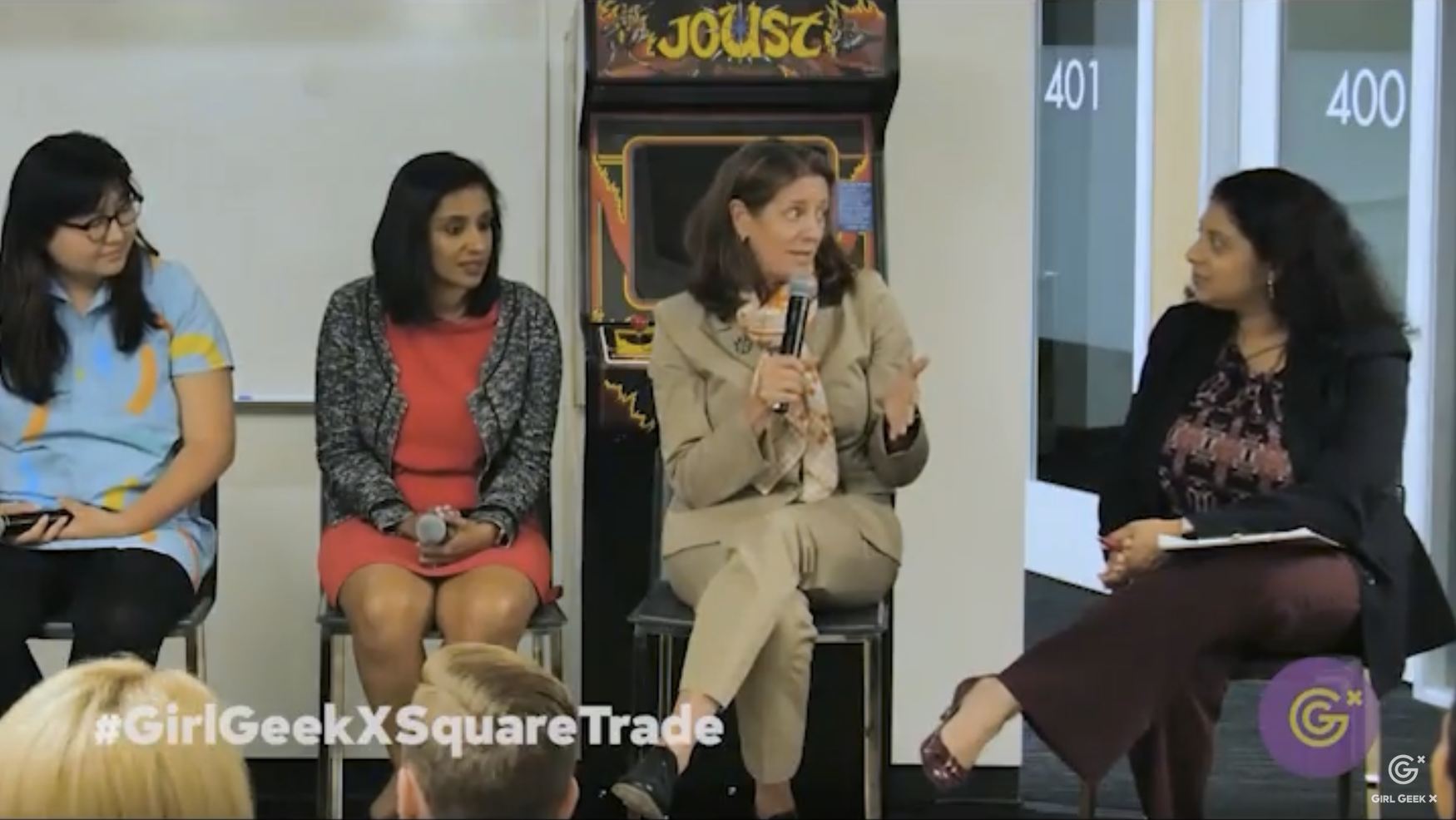
Staci Slaughter speaking at SquareTrade Girl Geek Dinner.
Staci Slaughter (SF Giants): And really a turning point for me was actually when I went on maternity leave with my first child because it was the year the ball park opened and he was born in the middle of the season. Of course we went to the playoffs that year too and I had to let go. I had to handoff and I had to say it because I had just never taken time off, really. I had to say, “Okay, you guys are going to have to handle that,” or, “You’re going to have to do that.”
Staci Slaughter (SF Giants): It was empowering for them because they were able to, like I said, step into my shoes, and do my job, and deal with our CEO, and deal with our Team Manager and General Manager. So for them, they were growing professionally and for me, it was a growth opportunity for me too because I realized that I could step back and trust the folks to do the job they needed to do. I didn’t have to do everything myself.
Staci Slaughter (SF Giants): It was a really pivotal moment for me to realize okay, that I don’t have to be there for every moment, that I can trust people, and I think they grow professionally as a result of that.
Wini Hebalkar (SquareTrade): So you really delegated then at that point?
Staci Slaughter (SF Giants): Finally, yeah.
Wini Hebalkar (SquareTrae): And let go.
Staci Slaughter (SF Giants): Yeah, I let go.
Wini Hebalkar (SquareTrade): Very good. Lisa, you started out in journalism too. What was that pivotal point that triggered that leap into leadership for you?
Lisa Fetterman (Nomiku): The leap into leadership happened every moment of my life.
Wini Hebalkar (SquareTrade): Okay.
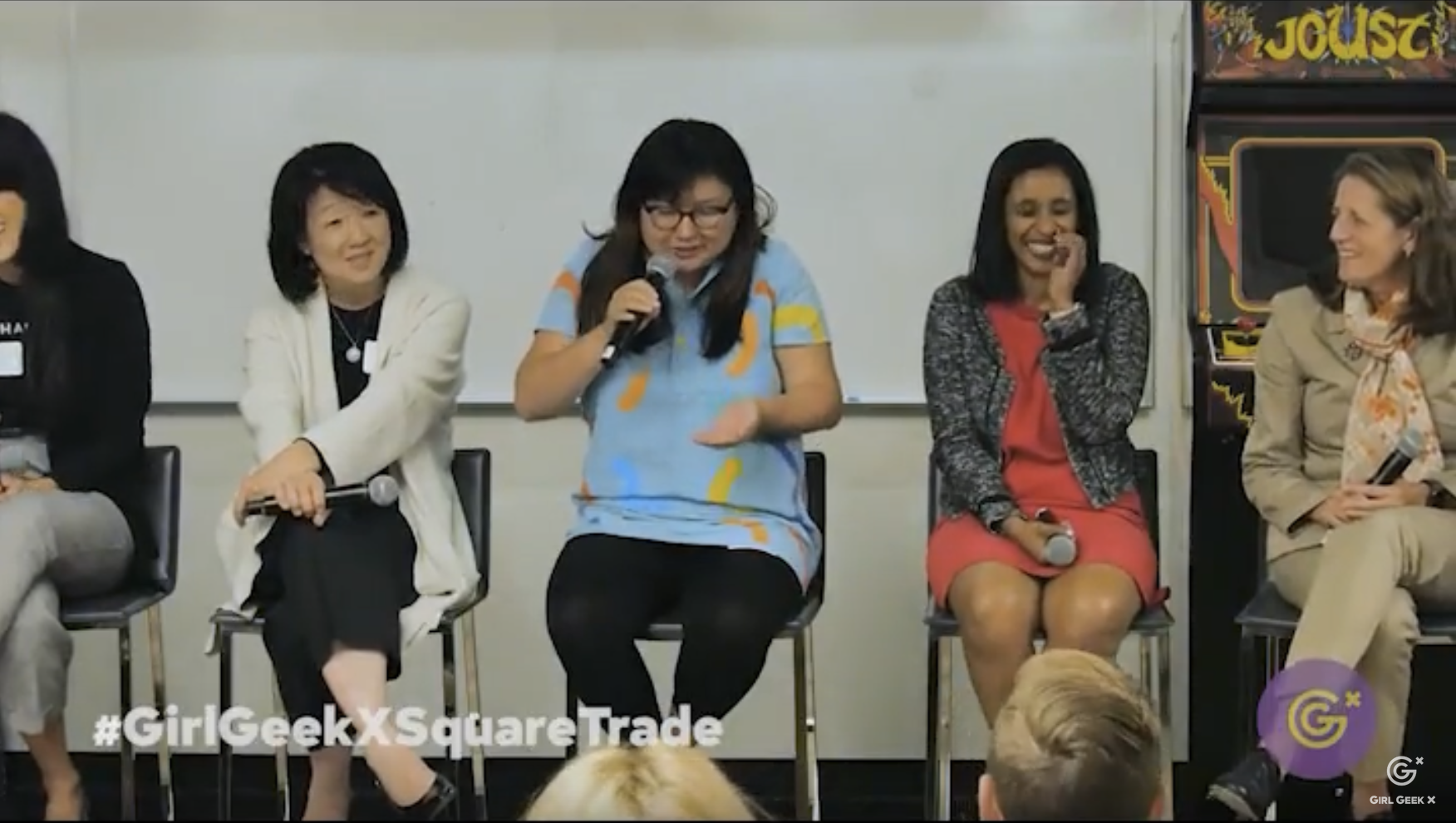
Lisa Fetterman speaking at SquareTrade Girl Geek Dinner.
Lisa Fetterman (Nomiku): I just created a … It’s a leadership moment when someone’s like, “Hey, who’s going to throw the ball at jacks? Who’s going to throw the hacky sack?” I’m like, “Me, me, me, me!” Very early on I was just like, “Yo, people don’t like to be leaders maybe because I’m dominating in all these leadership positions.” And then when I started Nomiku, that leadership moment, I was 22 and I put “CEO” next to my name and I was like (laughs). I was like, “I have to work really, really, really hard to grow into this title.” And at the same time, I was like, “That was it.”
Lisa Fetterman (Nomiku): So there’s nothing stopping everybody here from, tonight, updating your LinkedIn and Facebook being “CEO of ____.” Then as an exercise, put away some money and go through the exercise of creating a LLC or a C Corp or an S Corp and then you’re the CEO. You might be like (laughs), and then you grow into it. That’s what happened. I just made myself room to grow.
Lisa Fetterman (Nomiku): I mean, first it was small like, “Oh, who’s going to …” Like every role, when I have a small group from church, they’re like, “Who’s going to lead?” I’m like, “Me.” She knows. She’s from my church group. Holla! So many networks. I love community and I love leading it. Whether it’s like a small thing like, “Who’s going to bring snacks?” “Me!” Or, “Oh, I chose for me to be CEO.” I’m just constantly swimming towards it. You can do it. There’s a holy kind of of, “(singing) Ah! Leadership, take the baton!” And then it’s like I say, “Me!” and then it becomes you! The sooner you start the better because if you say you’re CEO now, four years from now, people are like, “Oh yeah, she’s the CEO. It’s been on that LinkedIn for a while.”
Wini Hebalkar (SquareTrade): So Claire, what are you the CEO of today?
Nupur Srivastava (Grand Rounds): Can you just ask her all the questions?
Claire Hough (Udemy): Yeah.
Wini Hebalkar (SquareTrade): When did you become CEO?
Claire Hough (Udemy): No… so when I hear Lisa talking, I see this duck that’s smoothly sailing in the lake, but underneath the water they’re pedaling like crazy. That’s you, working very hard.
Lisa Fetterman (Nomiku): That’s one sexy duck.
Claire Hough (Udemy): You look very … yeah… you look very smooth.
Lisa Fetterman (Nomiku): Thank you.
Claire Hough (Udemy): Yeah. I have to say I’ve been around the block a few times but young women these days impress me every day. I am so proud and privileged that I’m still sitting here being able to talk to you about my experience that sounds like it matters. I’m Head of Engineering. Not a lot of many women in Head of Engineering. So I am just proud that I was resilient enough to just keep in it.
Claire Hough (Udemy): One of the reasons why I stay there is for all of you to know that you can be Head of Engineering anywhere you want, right? There were a lot of opportunities for me to get out of engineering. People offered me other jobs like product, GM, or whatever. But because tech is such an unfriendly place for women, I didn’t want me to add to the number of women who’s getting out. I wanted to be resilient, stay in it, and add value.
Claire Hough (Udemy): So that’s my story of why I’m so old but I’m still in it.
Wini Hebalkar (SquareTrade): So stay in the game.
Claire Hough (Udemy): Yes.
Wini Hebalkar (SquareTrade): Stay as long as you can.
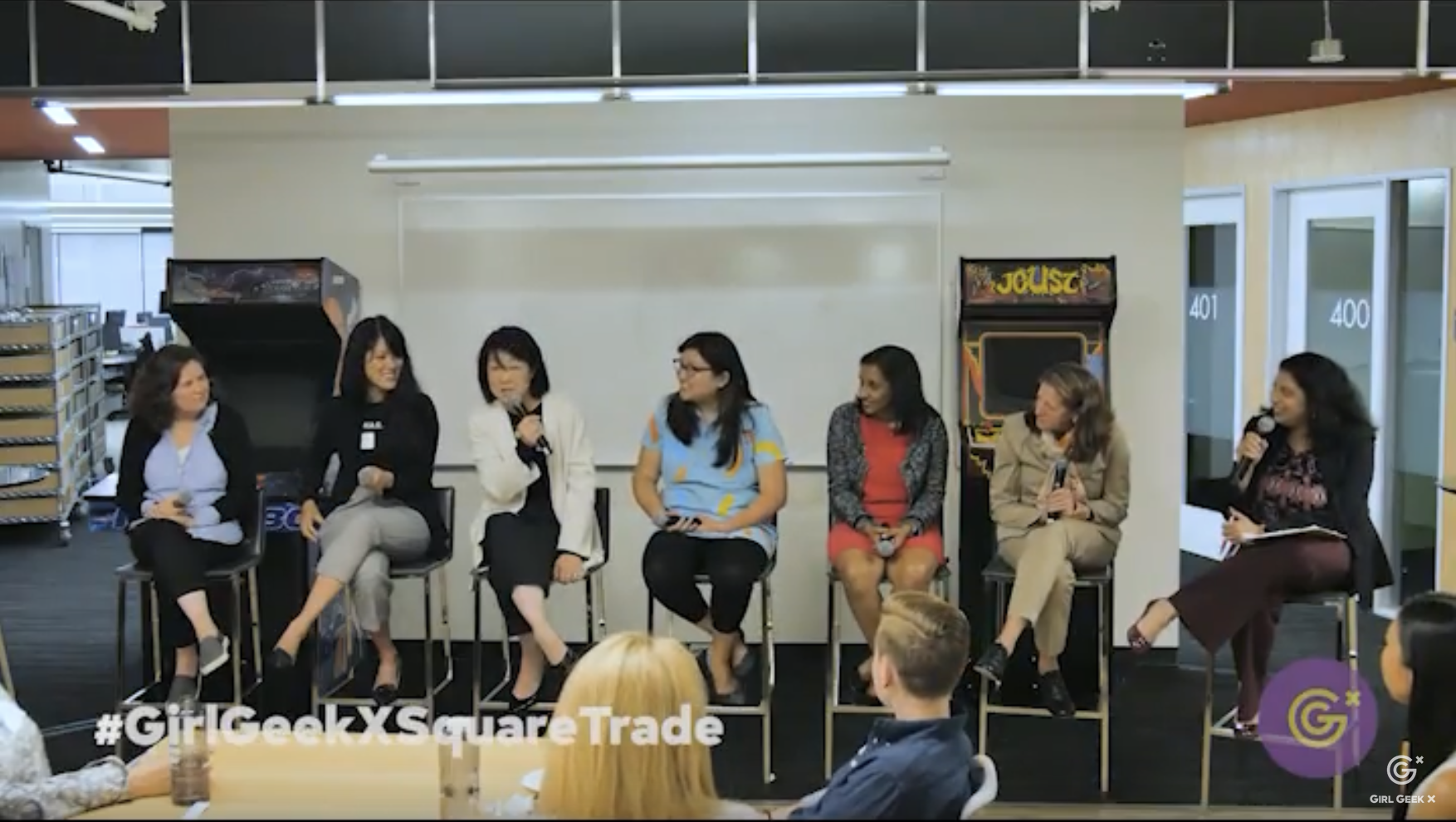
Claire Hough speaking at SquareTrade Girl geek Dinner.
Claire Hough (Udemy): Stay in the arena, take risks, and just be in it.
Wini Hebalkar (SquareTrade): Maybe I’ll direct this question to a couple of folks here. Some of you have described attributes or qualities that keep you in the game. So raise your hand, make sure you ask for that promotion, make sure you ask for that opportunity. Who in your life was a mentor, an important person that you might be able to attribute some of your success to? If there’s one thing I have learned in my career it’s that you can’t do it alone. You’ve gotta rely on your network around you, your support system whether it’s your family or otherwise. So who’s that important person in your life that you might attribute some of that success to?
Staci Slaughter (SF Giants): I grew up in a family of all girls and my dad was very clear about, “You can go do whatever you want.” Neither of my parents went to college. My dad didn’t graduate from high school. He’s a very successful political columnist in California. There was just never this barrier that you’re going to stay at … If you want to pursue a career, you can do that. If not … And my husband was always that way too because he’s always like, “You don’t ask for enough when you go in there and negotiate. You gotta go and ask for …” Kind of that same thing. But I’ve had Larry Baer, my boss, for the past 22 years.
Staci Slaughter (SF Giants): I really thought I was going to opt out when I had kids quite honestly. It’s just there were no women in the organization. We didn’t even have a maternity leave policy. I just always thought that I would and I had so many friends that opted out. There were times that my husband was in a trial and he’s a lawyer and I was working and I had these two little kids under two. I’m just like, “I don’t know how I’m going to do it.”
Staci Slaughter (SF Giants): I remember going into Larry’s office saying, “I think I need to take a break.” He’s like, “You may not quit. We will do whatever it takes. If you want to work three days a week, I don’t care when you get your job done. I don’t care if you come in late and stay. If you’re available, we have got to make this work.” That push, they knew it before I knew it that it was going to work. I got through those early years when the kids were really little and then they went off to school and I was like, “Okay, I’m so glad I stayed in it.”
Staci Slaughter (SF Giants): I think that’s really good advice that it’s staying in it and really continuing to grow professionally that gives me the flexibility now that I can go and do other really interesting things in addition to my job. I think that having that support network of men really saying, “You can do this and we’re going to make it work for you” enabled to create more flexibility within the whole organization. I’m proud to say we have a maternity leave policy, we have a paternity leave policy, and more men in our organization take advantage of that than women do. That’s important.
Wini Hebalkar (SquareTrade): Very, very cool. Thank you, Staci. Nupur, how about you?
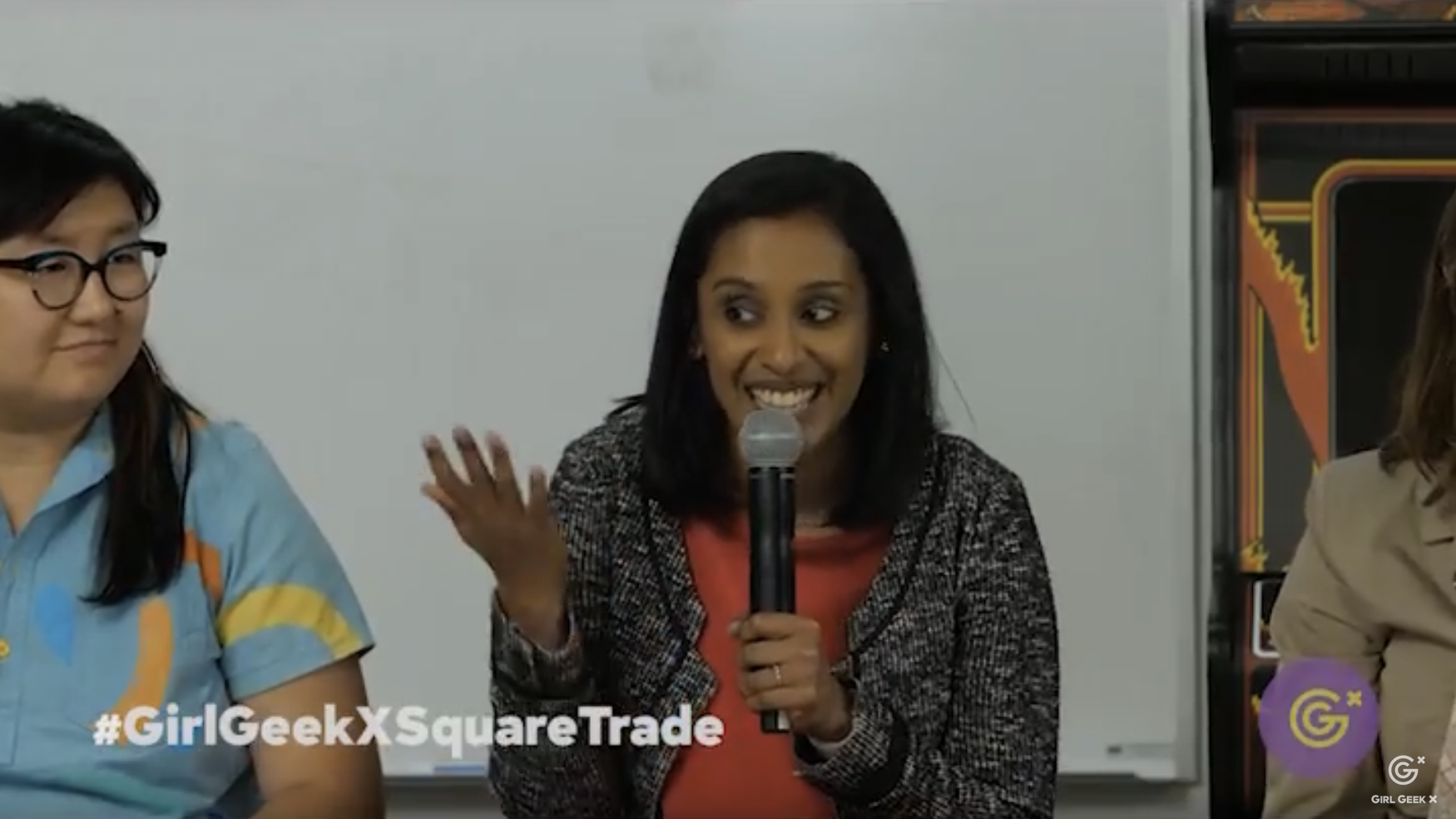
Nupur Srivastava speaking at SquareTrade Girl Geek Dinner.
Nupur Srivastava (Grand Rounds): It’s a very similar answer. Growing up, very much my dad. We were a family of six — four girls, two boys. My dad never made us think that we were any different than the boys. I grew up in the Middle East but in a super supportive household where my dad made me believe that I could do anything and fueled any interest that I had. I distinctly remember I really wanted to go to Stanford for business school and I was terrified that I wouldn’t get in, but it was the only place I wanted to go. I remember calling my dad and he said, “Just apply. What’s the big deal? You’ll get in.” I was like, “Okay.” You know? I was like, “That was easy.”
Nupur Srivastava (Grand Rounds): 37 essays later, I was super lucky to be accepted there but without my dad’s confidence, I wouldn’t be able to. I think right now, it’s probably my husband. I know he’ll be very happy to hear I mentioned him tonight. Nana, please tell him I did. That’s my sister. It’s really important, I think, to have a partner that’s super supportive. I think he’s certainly pushed me a lot and given me the confidence I need time and again to keep reminding myself that I can do what I do. So very similar.
Wini Hebalkar (SquareTrade): One of the things we’ve been talking about at SquareTrade is this concept of an imposter syndrome. Show of hands, who’s heard of the imposter syndrome? Wow, okay. Pretty good. For the few of that didn’t raise your hands, what the imposter syndrome is a concept in psychology where you have a feeling that you’re somehow not worthy of the success you’ve had.
Wini Hebalkar (SquareTrade): Many of the women in leadership honestly have had this experience and had this feeling where they feel like no matter how hard they try, and how many levels they are successful at achieving, and how many projects and successes they’ve had, that somehow they don’t deserve it. They’re a fraud. So to just get a sense from this panel, how many of you have experienced the imposter syndrome and what do you do to overcome it?
Margaret Reeves (SquareTrade): There was recently a New York Times article also that said that it’s even stronger if you’re not like everyone else around you, you don’t have the standard background for your role. I’m here VP of Product, we’re a technical product team. I don’t have a CS background, I don’t have a tech degree. History, woo! And I don’t have a MBA. That’s the other common background for my role. I’m not the normal background.
Margaret Reeves (SquareTrade): A few years ago, we were talking about hiring practices here and somebody brought up the concept, you’ve probably heard this, that A players hire A players and B players hire C players. I was like, “Ooh, what am I?” What I did to talk myself out of it, which I did, was I thought about all the people who had hired me over my career and did I think they were A players? Yeah, they’re some … And about half of them were women and they’re amazing women.
Margaret Reeves (SquareTrade): I also thought about those people who had hired me, no matter what level I was, they were Senior Manager or a Director, a good percentage of them, amazingly, have gone on to be C-Level. So not only do I think they were smart, the world thinks they’re smart. They are smart. So they’re most definitely A players, so if they’re A players, then I gotta at least be a B+, A-. I’m good. I think, you know, think about the people who support you, and believe in you, and have entrusted you to do things. They’re smart so you’ve got this.
Wini Hebalkar (SquareTrade): Bonnie, how about you?
Bonnie Shu (Harbor): Yeah, so starting out as a really young female attorney straight out of law school, of course I felt the imposter syndrome. You have these opposing counsels who are really mean and scary, and they’ve been the business for 40 plus years, and all they want to do is bully you around because they think they can and they think that’s going to help them win their case. Really for me in those moments –
Bonnie Shu (Harbor): I kind of have this tough love approach with myself where I’m like, “You know what? You’ve got a job to do. You have a client you have to put your full, best effort for and you have to separate out those feelings of insecurity and say, ‘Look, I gotta get this done and I gotta crush it.’
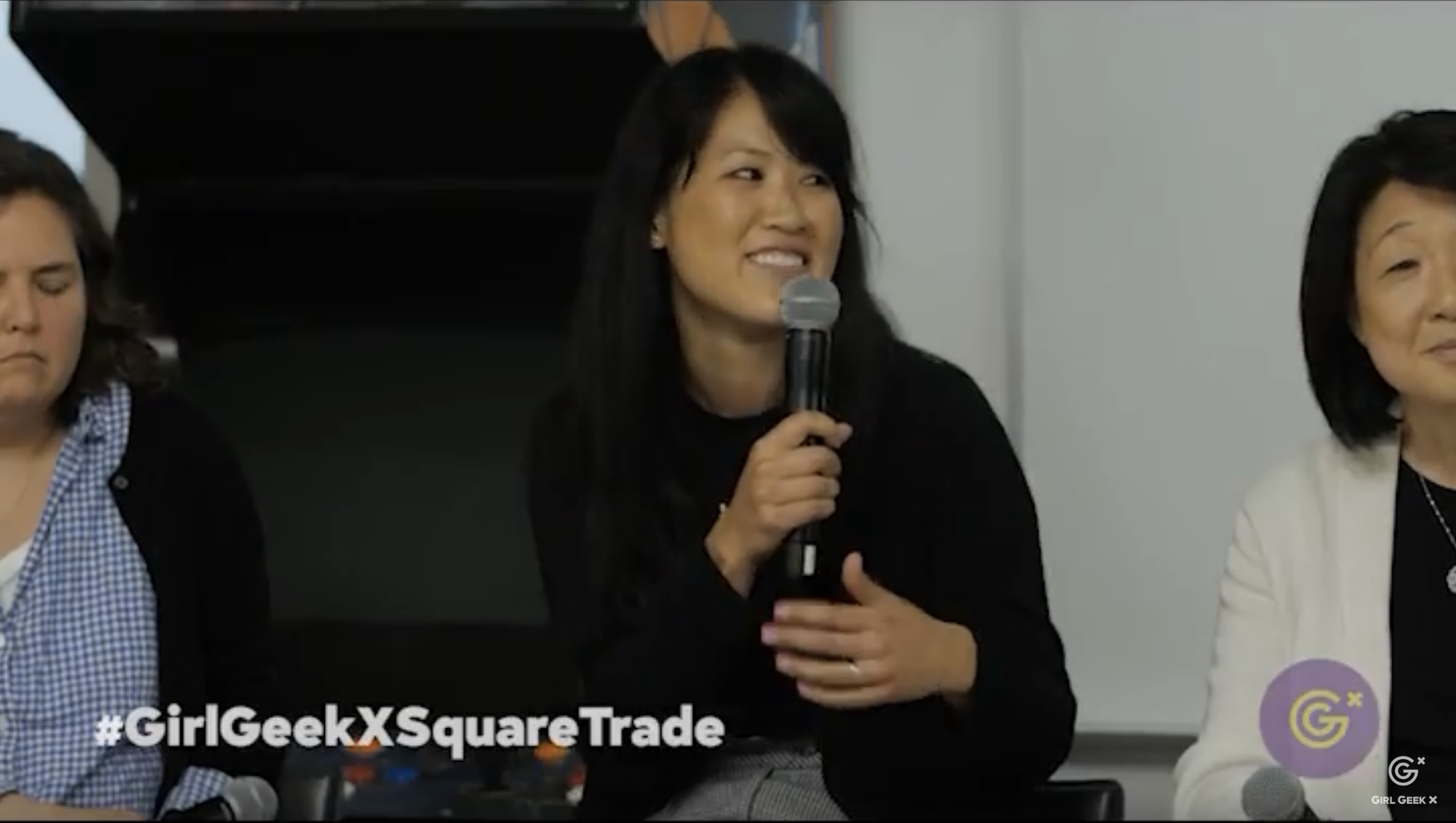
Bonnie Shu speaking at SquareTrade Girl Geek Dinner.
Bonnie Shu (Harbor): So taking that to tech where you’re a first-time manager, that’s really scary. All of a sudden there’s people expecting you to know what you’re doing, and you’re like, “Uh, I don’t know what I’m doing.” You just gotta kind of put those feelings aside a little bit and just look at it from a very objective perspective and say, “I have a job to do and I’m going to kill it.”
Wini Hebalkar (SquareTrade): As women, we’re pretty humble. Many of us are. But if you do get that opportunity, and you do have that success, don’t sell yourself short. Really. Don’t sell yourself short, right? You have earned it. You’ve earned the right to be there. You’ve earned the right to that success. It’s not just a team effort; it’s your success. Own it. I think that’s the one piece of advice that somebody gave me a long time ago. It was a mentor of mine. And it stayed with me for a long, long time. I’m sure, Staci, you have had a similar experience when you’ve had to overcome that imposter syndrome. What’s your story?
Staci Slaughter (SF Giants): Well, yeah. I mean, gosh, going to work, my job at the Giants, it was all men, all the time. Then we were building a ball park so I’d be in these construction meetings. They were all incredibly supportive and nice, but I did feel like, “Oh, I didn’t completely measure up. What am I doing here?” I think part of it is I just started to get them to mold toward us a little bit more. There was this badge of honor you had to stay until the very last out of every game, even if you didn’t have game day responsibilities, or you had to travel with the team and all this stuff.
Staci Slaughter (SF Giants): There were women at the Giants and other men at the Giants who were like, “No, we’re not going to do that. We’re not going to have our children raised by nannies, we’re going to have a life outside of the game.” Slowly but surely, people started taking vacations in the middle of the season, and having people cover for them, and starting to change the culture of the organization.
Staci Slaughter (SF Giants): It was a really slow turnaround. But there was a group of folks who wanted to say that there was a different way to do that. And so rather than trying to conform to what was the norm there, we tried to have them conform more toward us. Then I started feeling much more comfortable in my role at the Giants and I’m still there.
Wini Hebalkar (SquareTrade): So build your posse.
Staci Slaughter (SF Giants): What’s that?
Wini Hebalkar (SquareTrade): Build your posse, build your network around.
Staci Slaughter (SF Giants): Yeah, build your nest, your posse, and have people who think like you. I just think it’s balance, it’s trying to find balance.
Wini Hebalkar (SquareTrade): Yeah, balance is super important. Claire, maybe I’ll ask you to start us off with this next question. What are some strengths that you think female leaders bring? Now today, I have not really talked about women in leadership; we’ve really talked about leaders and showing you how women can be amazing leaders. But there are some ways that women differ from men in their strengths and what they bring to the table. What are some strengths that you think you bring? What have you seen work well in the workplace and what should we watch out for?
Claire Hough (Udemy): I think we have all the strength the men bring to the table, number one, and perhaps we have even more because I think our brain is wired to be able to handle multiple issues and find that balance, right?
Claire Hough (Udemy): As a female leader in a mostly male executive team, I think what I bring to the table, for me it’s been a different perspective and also my experience of many years of being in tech. I think these are things that men can bring as well. I think you should approach all situations with confidence that your experience brings that specialness, whether you’re women or men.
Claire Hough (Udemy): I think as a woman, people think I have more empathy and you know, today one of my women engineers said, “You smile more than other male leaders.” I don’t know why they don’t smile as much but I think these are your strengths that you can bring to the table, who you are, being authentic, and approaching people with what your personality brings to the table. I am actually very interested in people in general, so I want to get to know people, I want to get to know their strength, I want to get to know their backgrounds and all that. I think that builds very strong relationships and when you actually build that relationship of trust, it’s much easier to get stuff done because they trust you, they know you trust them.
Claire Hough (Udemy): Even if you’re in times of crisis, how you handle those situations together as a team, it changes the whole picture. I don’t know whether any of you have read Kim Scott’s “Radical Candor” — I am actually very blunt communicator; I just get to the core of the issue and yet, people don’t get offended by it because they trust that I trust them. I’m giving that feedback with personal care as well as just good intentions of wanting to do the right thing.
Wini Hebalkar (SquareTrade): How about you, Lisa?
Lisa Fetterman (Nomiku): The strength of the female leader is the element of surprise! It really is. For me, what I’ve found is people have preconceived notions of what women might be better at than men and what they come to toolkit with, and then what we may be insecure about like imposter syndrome. I’m going to be like, “I’m going to whip it up for you. Done.” In fact, I’m hungry for more recognition and did you know I also did this? I just like to go into whatever I’m going in with where people are … I just surprise them. There was one meeting I had with a VC and I presented my magical life-changing machine. It’s magical! It cooks food for you in 30 minutes. The same food that Michelin Star chefs do.
Lisa Fetterman (Nomiku): I’m like, “Go! This is revolutionary. Put it in your mouth. Yum yum!” I did the whole thing plus presented the numbers. Like, “Wow, numbers! Look at this chart! Up and to the right, up and to the right,” and then afterwards … Same energy too, same energy. I was met with like this. And then he was like, “Yeah, you know what? I’m going to talk with my wife about it because I’m going to see if she’ll use it.” And here’s where comes the element of surprise, okay? I said to him, “Wow! Your wife is also a GP too at this firm, just like me and my husband are co-founders!” And he didn’t talk to me ever again.
Claire Hough (Udemy):: If you didn’t sign up for Nomiku, it’s the time to go do it. I signed up. But had I met Lisa before I signed up, I would have run to the counter.
Wini Hebalkar (SquareTrade): Okay, before I turn it over to the audience, one last question from me. Think back to 10 years ago, what advice would you share with your younger self knowing what you know today?
Nupur Srivastava (Grand Rounds): That’s a tough one. I think I was always high-strung, so I would say, “Things will work out, calm down.”
Wini Hebalkar (SquareTrade): Okay.
Bonnie Shu (Harbor): Okay, I think I’m ready. I think for myself, I came out of school expecting to have a set path, a set career, knowing exactly what I was doing for the rest of my life.
Bonnie Shu (Harbor): I think I would tell my younger self, “Stop thinking about this so much. Just do what you want to do. You can change careers. It’s not the end of the world. You can change jobs, you don’t have to stay at the same job for the rest of your life. So just chill,” I think, I would tell myself.
Wini Hebalkar (SquareTrade): Margaret, how about you?
Margaret Reeves (SquareTrade): I’m trying to think back to what I was doing 10 years ago.
Wini Hebalkar (SquareTrade): We can go back five years.
Margaret Reeves (SquareTrade): I think 10 years ago, I actually, I think that’s when I was actually making a big leap and I left a company I had been at for a long time and was making a switch. I’m not sure I’d give advice to myself but I’d tell myself, “Don’t worry, it’s all going to work out. Leaving is the right decision.” Sometimes moving on is the right choice, although not for any of my team who are here by the way. No, now is not the time to move on. Stay.
Wini Hebalkar (SquareTrade): It does matter if you’ve been here a long time.
Claire Hough (Udemy): I would say I wish I had the self-confidence. When you’re young, you’re generally insecure or maybe a lot of you are not. Just tell yourself that you deserve at least 10x more self-confidence than you already have because you do. If you look at people who are successful, they carry that presence and self-confidence.
Claire Hough (Udemy): I think that’s one advice I would give to anybody walking into interviews or walking into meeting people who could influence you. Just lift yourself up, just tell yourself, “You deserve 10x the self-confidence you’re walking in with.”
Claire Hough (Udemy): I wish I had that advice because I think always going in, underselling yourself, it’s not where we ought to be. We are many, many years from where our mothers were, so let’s lift all ourselves up because I see a lot of women coming into interviews underselling themselves. Their resumes written in a way they undersell themselves. Stop it. You deserve much, much more.
Wini Hebalkar (SquareTrade): Okay. I am now going to open the floor to questions. Who has questions?
Audience Question: I do know there was some mention about how your engineering is very male-dominated and I found personally that women who are more successful are often viewed more negatively by both men and women, while men who are more successful are often viewed more positively. How have you handled this challenge and how do you think that the status quo can be changed?
Claire Hough (Udemy): I’ve been in tech for a long time and it’s very disheartening to me that tech has become increasingly unfriendly for women, especially women engineers. Statistics say that a lot of women get out of engineering at a faster rate than men. These are all very disheartening statistics and I think we’re trying to turn that around.
Claire Hough (Udemy): You can only turn that around by educating people and actually having people become really aware that we’re all people, we all have strengths, and we have backgrounds that we bring to the table. A lot of companies do unconscious bias training. That alone, it’s not enough. You have to have these conversations constantly.
Claire Hough (Udemy): During my career, of course every job I go to, I have to reprove myself, although my resume is very long and has very reputable companies in it and I’ve earned promotions at those companies. And yet, sometimes when I get a new boss, they always question, “Can you do this job with mostly, in dominantly male population, male engineers?” At one time, one female executive actually said, “I’m not sure you could handle our male dominant engineering team,” even though I came out of companies where it was-
Wini Hebalkar (SquareTrade): Very male-dominated.
Claire Hough (Udemy): Largely male, right. I think we have to just keep educating others and I think actually, the younger generation’s much more open to this idea of diverse work environment, that you could learn from each other. There’s lots of statistics that diverse engineering organizations actually deliver better products or diverse companies do much better in the marketplace. So these are not just, “Diversity’s good therefore you should do it,” there’s statistics that better products are built, better companies come out of having more diverse workforce.
Claire Hough (Udemy): So we need to be constantly educating, but also being empathetic to learning about each other’s background. When I talked about imposter syndrome with my entire engineering team which is about 80% men still — actually men also raise their hand when we asked, “Do you have an imposter syndrome?”
Wini Hebalkar (SquareTrade): Wow.
Claire Hough (Udemy): It’s not just women. So we have to be empathetic to what their imposter syndromes may be and just have that empathy and through conversations and through sharing experiences, I think we could change the workforce.
Lisa Fetterman (Nomiku): Nobody has to like me as long as they buy my stuff and my girl gang likes me. That’s the most important part. Having your best, best girls who you really, truly admire like you and anchoring yourself in that, that’s how … Everybody’s like, “Oh, they didn’t like you,” I’m like, “Mm, sucks.”
Lisa Fetterman (Nomiku): It’s a good thing my kids like me, and my husband likes me, the girls, people with high moral fiber like me. I’m like, “Oh yeah! I’m into that.” This whole thing, the way this question’s framed, there are less likable duh, duh, duh. Does that matter though? Does that matter? Because they better get used to me, they better get used to us, and then they’ll like it. They’re like, “Oh yeah, what’s not to like. They’re all just right there.”
Wini Hebalkar (Squarerade): Cool. Wow, wow.
Claire Hough (Udemy): You just won.
Nupur Srivastava (Grand Rounds): I like you.
Lisa Fetterman (Nomiku): Thank you. See? She likes me. Nice!
Wini Hebalkar (SquareTrade): There you go.
Lisa Fetterman (Nomiku): I like you too!
Wini Hebalkar (SquareTrade): Who here does not like Lisa after that one?
Margaret Reeves (SquareTrade): Unconscious bias training only goes so far. One tactic I use is I try to call things out when I see it, but I try to do it with humor. It’s kind of been a joke around here when everybody says, “Man power” or “Man hours” I’m like, “People hours.” I’ve actually got some other people doing it now. Just trying to make people realize but do it in a not … I do it in a non-threatening way at least and making it not … I’m not accusing them of doing something of wrong, I’m just making people aware.
Audience Question: What you said about stepping into leadership, 100%, love it. That’s always been me and I don’t apologize for that confidence because I think it’s one of the biggest career pushes and personality pushes you can ever enable for yourself. But be that as it may, the biggest challenge or one of the biggest challenges I’d say that I run into with my leadership style is that time and again, the feedback I get is that I am intimidating. I hear that and it breaks my heart because I am a kind person, I care a lot about how I’m able to mentor the people in my community, and build strong leaders to take over when I graduate, and keep on creating the community that we love.
Audience Question: When I hear that, part of me wonders how would this be perceived differently if I was a guy? To what degree do I care? How do I handle that without diluting what makes me a strong leader? Sometimes I want to call BS on it. The other times, it has an effect on how I’m perceived in my community and how effectively I can lead because you can’t empower people who are nervous around you. So I was wondering if you had any experience in that space and what kind of advice you would give for remaining a strong leader and not apologizing for your confidence while continuing to bring people up around you.
Lisa Fetterman (Nomiku): How would it be different if you were a guy? You already know the answer. I used to get that all the time, that I was intimidating. All the time when I first started. I was like, “What the eff is going?” So then I tried this new method — well, it’s an old method — it’s the Socratic method.
Lisa Fetterman (Nomiku): Whenever somebody, I could feel them pulling away from me, I would just ask a shit ton of questions about why they do this? Why do you think this? Why is this place there? Why did you choose that color instead of that color? What is the message you’re trying to get across?
Lisa Fetterman (Nomiku): Ever since I started the more questioning thing, I never get “intimidating“ anymore. People are just like maybe, “annoying,” maybe “exhaustive,” but no longer “intimidating” when I added way more questions, way, way, way more.
Staci Slaughter (SF Giants): Can I jump in on that?
Wini Hebalkar (SquareTrade): Yes, Staci. Go ahead.
Staci Slaughter (SF Giants): Someone was saying something and it reminded me of when you were asking that question. There’s another woman who I work with and we were both two of the early senior leaders in the organization. We would say something or we would do something and we would get these weird looks. One day she and I were talking, we’re very close, and I was like, “Do you think they’re intimidated by us? If we say something, they automatically jump.” I’m like, “Why are they afraid of us?” Because I had that imposter thing going on at the same time.
Staci Slaughter (SF Giants): So what I realized is all of a sudden there was this ah-ha moment that she and I are in these pretty high positions within the organization and when we say something, apparently people are supposed to jump and do it. What I found is to try to break … Because you know, I grew up in the organization. I was a 20-something when I started and I still saw myself, even though I had senior position, now I’m a 50-something.
Staci Slaughter (SF Giants): What I tried to do though is to meet people where they were on a personal level, so really making the effort to get to know people outside of just the meeting we were in about whatever event we were planning and really try to get to know each other on a human level.
Staci Slaughter (SF Giants): If someone had a baby, check in with their family, things like that. And really spend time with them, go grab coffee, go grab lunch. We started putting together these women mentor groups at the Giants because the really cool thing now is that we’re half women and half men and we have just an incredible group of young women and we have squads.
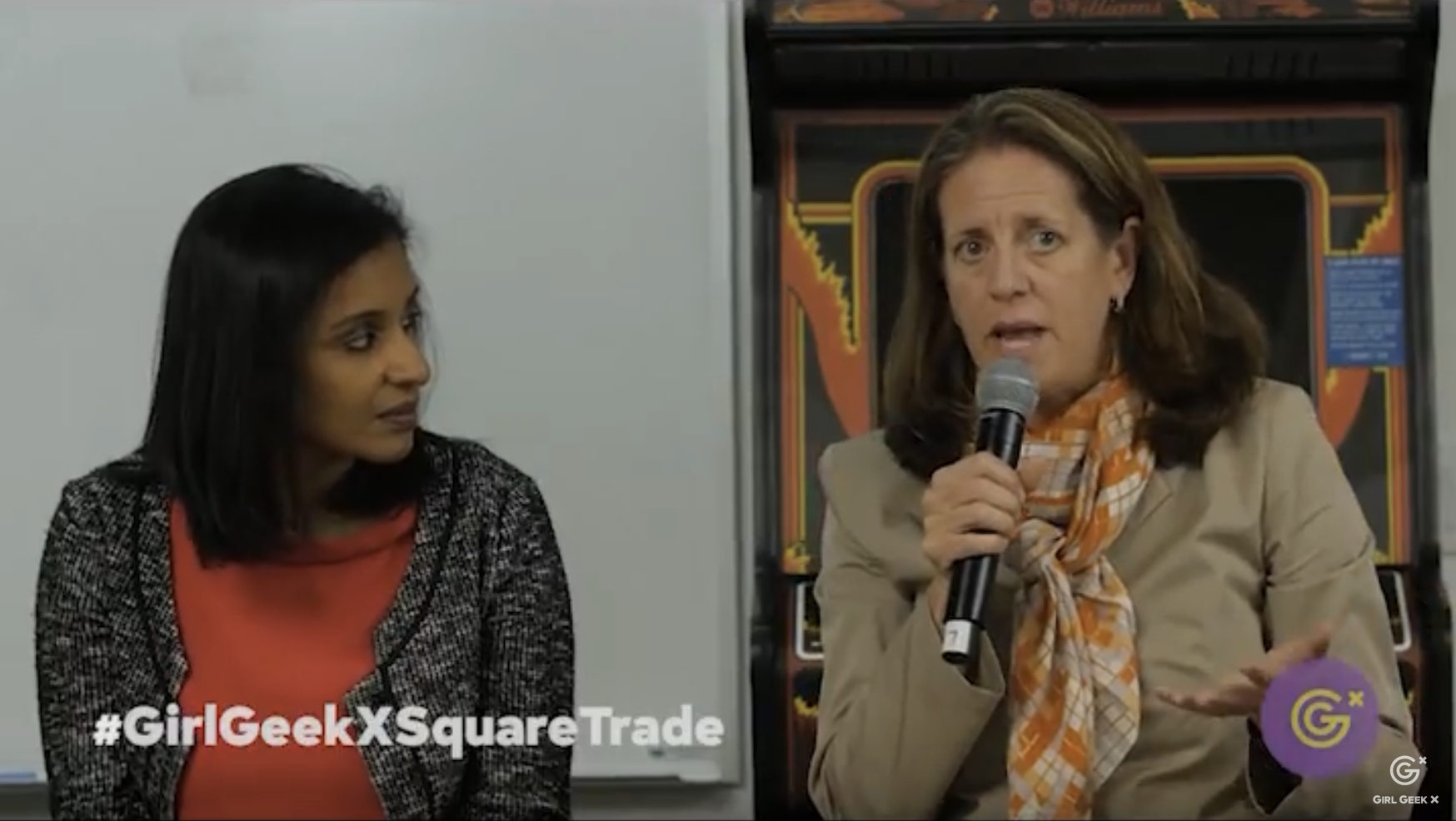
Staci Slaughter speaking at SquareTrade Girl Geek Dinner.
Staci Slaughter (SF Giants): We have older women paired with — there’s about 10 of us in a squad — older women with younger women in all different senior leadership, middle management, administration, everything. It’s really cool because a lot of times we just go for a walk around a ball park. We’re like, “Okay, meet at 12:00, let’s go take a walk around South Beach.” It’s breaking down those barriers outside of the meetings that I think has really helped with the breaking down the intimidation factor.
Wini Hebalkar (SquareTrade): Okay.
Josephine Chan (SquareTrade): I think, Wini, we have a question here.
Wini Hebalkar (SquareTrade): Yeah, we have time for maybe one or two last questions.
Audience Question: I’m a Product Manager here. I wonder what’s your advice on what’s the difference between from IC to your leadership position that you’re in now and how you would prepare for that in terms of, for example, strategic thinking and other aspects that you probably know much better than me? Thank you.
Nupur Srivastava (Grand Rounds): It’s very different. Very, very different. If you’re an IC, you’re mostly evaluated based on your scope, your project delivery, how you communicate with others and what have you. As a leader, your product is your team, so a lot of your role becomes enabling your team to success; a lot of your role becomes making sure you have the right leadership bench so that they can deliver the right results; your role becomes setting a strategic vision so that everybody feels like they’re swimming in the same direction with a goal that actually motivates them.
Nupur Srivastava (Grand Rounds): The notion of being authentic and open becomes really important because that’s when your team trusts you and works hard to deliver results for you. So it’s actually an incredibly different role when you move into management from being an IC. Obviously a very exciting one and one that I think everyone is more than capable of doing, but a very different skillset for sure.
Wini Hebalkar (SquareTrade): Is there anything that Individual Contributors can do today to prepare themselves for that shift?
Nupur Srivastava (Grand Rounds): I would just say quickly that I think many of you, even in your IC roles, I’m sure have opportunities to display leadership, right? Whether that means stepping up, raising your hand for a tough project, helping your team rally behind a goal, communicating difficult things to your management and giving honest feedback. I think I see many leaders in my team, even though they’re ICs. So I think there’s plenty you can be doing in the way you carry yourself, and in the work that you do, and in the results that you deliver that make me see leadership potential for ICs as well.
Wini Hebalkar (SquareTrade): Okay. One last question.
Audience Question: What I’m struggling with right now is managing my time. How much technology should I be studying versus how much leadership skills should I be studying? Like soft skills versus hard skills, which I believe should be called technical and non-technical skills. How do you find the perfect balance without jeopardizing your Individual Contributor role?
Margaret Reeves (SquareTrade): I have thoughts. I think the switch from Individual Contributor to managing your first person is the toughest shift in your career. I know I did it terribly the first time I did it and I’ve seen other people do it terribly. When you’re a strong IC, you’re really good at your job, and you’re on all the details, and you know everything, and you know the technology, you know your product really well. And then you’ve gotta manage someone and you’ve gotta trust that they’re going to do it.
Margaret Reeves (SquareTrade): You have to let go and empower them, and not micro … It’s really hard to not micromanage because especially if they’re taking over some of your stuff, and you know it so much better than them, and if only you were doing it, it would get done in half the time but you don’t have that time and that’s why you’ve got a helper.
Margaret Reeves (SquareTrade): You’ve got to learn to let go and how do you coach and mentor and have the patience to let them make a few mistakes but guide them along the way? So rather than training for it, I would think about, okay, you’re now a manager. How are you going to empower the person who you’re managing, who you’re leading, how are you going to lead them and help them along the way, help them do their job? That’s my perspective.
Claire Hough (Udemy): I think as an engineer, I think first chance that you get at showing some leadership is how you mentor more junior engineers. You’re still keeping up your technical skills because you’re still doing your technical work, but you’re reviewing somebody else’s work and giving them advice or giving them good feedback on how they’re approaching problems and all that. I think that builds your skills alongside your technical skills, so then your mentoring skills become one … You’re mentoring one engineer, you’re mentoring the next engineer, and then you’re building that. As you’re taking on those mentoring skills and time to mentor, then you are going to do less technical work over time, but that doesn’t mean that you’re not keeping up with technology. Right? At some point, you may have a big team such that you cannot keep up with every single thing that everybody’s doing. That’s when you have to let go and trust other people that they know what they’re doing.
Claire Hough (Udemy): I think I always tell the first-time managers that your success is not about you; it’s about your team. The output that you should measure yourself is the output of your whole team as well as the growth of your whole team. You have to, at some point, change that, change how you’re looking at yourself. But I think there’s a lot of satisfaction in mentoring others, so enjoy that where that’s happening and don’t worry about that whatever, that 20% of time I’m spending mentoring others is somehow taking away from me. It’s not. It’s adding to who you are as an engineer by giving that feedback.
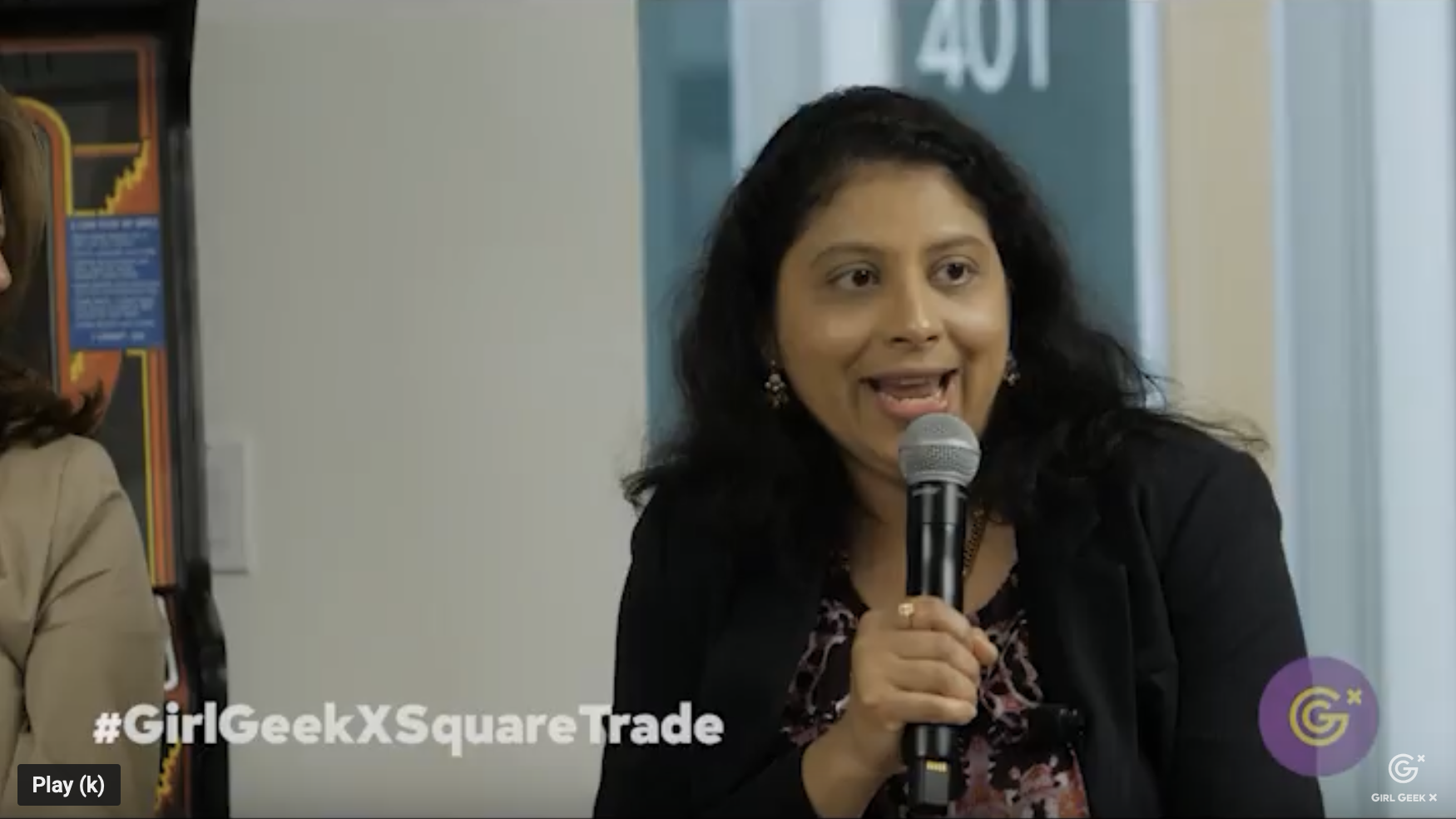 Wini Hebalkar speaking at SquareTrade Girl Geek Dinner.
Wini Hebalkar speaking at SquareTrade Girl Geek Dinner.
Wini Hebalkar (SquareTrade): Wow, some amazing advice to leave us with. Make sure you mentor some junior team member, make sure you don’t sell yourself short, stay in the game. If you guys are early in your careers, you can always be an Individual Contributor and a successful leader at the same time by doing just this one other thing.
Wini Hebalkar (SquareTrade): Mentor somebody else, form a network with like-minded individuals like you, and help promote them and help promote yourself. I just want to take this time to thank our panelists for being here — I hope you guys all enjoyed it.
Wini Hebalkar (SquareTrade): I hope you all took away at least one thing that you can implement as soon as you go back home or maybe tomorrow morning when you wake up.
Like what you see here? Our mission-aligned Girl Geek X partners are hiring!
- See open jobs at SquareTrade and check out open jobs at our trusted partner companies.
- Does your company want to sponsor a Girl Geek Dinner in 2021? Talk to us!


